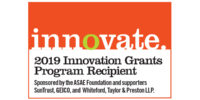Lynn Valenter, vice chancellor for finance and operations at Washington State University (WSU) Vancouver, becomes the 2019–20 chair of the NACUBO Board of Directors on August 1. She succeeds Lynne Schaefer, vice president for administration and finance, University of Maryland, Baltimore County. Valenter has served on the NACUBO board since 2014, and was the WACUBO president 2015–16. She was NACUBO board secretary 2016–18.
In her role at WSU Vancouver, which has more than 3,500 students and isone of six campuses that comprise the Washington State System, Valenter provides leadership for the areas of budget and accounting (including grants and contracts), capital planning and development, dining services, facilities operations, human resource services, and public safety.
In addition, Valenter has contributed to developing and executing five-year strategic plans for WSU Vancouver that have resulted in elevating its purchasing capacity, improving facilities operations service levels, and funding and executing preventative and predictive maintenance and minor capital projects. As a liaison with the community and Clark County government, Valenter has also collaborated with local school districts, municipalities, city/county departments, ports, and the business community on land use, planning, and other issues.
Valenter began her career at WSU Vancouver as the facilities and auxiliary services manager in 1997. She was promoted to director of finance and operations in 1999, and then to vice chancellor in 2005. Valenter served as interim chancellor 2010–12.
Valenter holds a Master of Business Administration from WSU and a Bachelor of Science in hotel administration from Cornell University, Ithaca, N.Y. She previously has held resort industry management positions and was a faculty member at Scottsdale Community College in Arizona.
The NACUBO vice chair for 2019–20 is Robert Moore, Colorado College, Colorado Springs. Wilma Phillips, Faulkner University, Montgomery, Ala., will serve as secretary.
NACUBO is pleased to present its latest online-based courses, featuring chief business officers in several short, focused videos. These micro sessions are designed to help future, new, and established chief business officers at colleges and universities—as well as those interested in learning more about the CBO role—meet specific leadership competencies. Each course is fewer than three minutes, immediately followed by two to three short questions.
Microlearning is an effective approach to workplace learning that delivers targeted lessons to employees in their workflows, so they can naturally learn new behaviors over time. Sessions offer one learning objective or one single concept at a time and in a variety of modalities, including whiteboard animation.
Learn more about e-learning by visiting our website’s “Conferences and E-Learning” section.

The microlearning project at NACUBO is a recipient of the 2019 ASAE Foundation Innovation Grant. The principal investigator is Tadu Yimam, vice president, digital innovation, NACUBO.
NACUBO has promoted five internal leaders as part of an organizational restructuring to better align the association with its strategic priorities. NACUBO’s new leadership team, led by President and CEO Susan Whealler Johnston, comprises:
- Liz Clark, vice president, policy and research.
- Marta Perez Drake, senior vice president, member engagement.
- Matthew Hamill, senior vice president, strategy and solutions.
- Randy Roberson, vice president, leadership development.
- Tadu Yimam, vice president, digital innovation.
New to the leadership team are Liz Clark, Randy Roberson, and Tadu Yimam. Clark will expand her former federal affairs role to oversee research and communications. Roberson will be responsible for the design, delivery, assessment, and regular improvement of NACUBO’s meetings and workshops and for launching new efforts; he previously served as director of strategic initiatives and in member engagement roles. Yimam, who previously led the association’s online learning and publications efforts, will merge technology with marketing to create a new content delivery architecture.
Current senior vice presidents Marta Perez Drake and Matthew Hamill will focus on association strategy, including member engagement and an emerging leaders program, and business development and foundation relations, respectively.
“At NACUBO, we are working tirelessly to become an indispensable asset to our members,” Johnston says. These are the right visionary leaders to have in place as we innovate and expand our offerings to help business officers operate at the highest level possible.”
The leadership team structure also includes a vice president, finance and administration, a position that is currently vacant. NACUBO is preparing to conduct a search for this leadership group member.
NACUBO’s new offerings will include microlearning programs, expanded tools from its Value of Higher Education initiative, new leadership development opportunities, and more. Additional member tools and services will be added throughout 2019 and 2020.
 Winning Combinations: A Guide to Mergers and Acquisitions in Higher Education
Winning Combinations: A Guide to Mergers and Acquisitions in Higher Education
Written for both institutions considering their next big strategic move as well as for those wondering how they’ll keep the lights on 10 years from now, Winning Combinations: A Guide to Mergers and Acquisitions in Higher Education offers readers insights into a new intersection for higher education. Full of real-life examples, this is not a step-by-step manual or a prescriptive textbook on how to orchestrate a merger or acquisition. This NACUBO guide taps into the collective experience of more than a dozen leaders in higher education who have initiated, observed, facilitated, participated in, contributed to, and analyzed all types of mergers, acquisitions, and consolidations: public/public, private/private, public/private, public/for-profit, and private/for-profit.
They’ve been in the trenches, and they candidly share their thoughts, opinions, and observations—plus some valuable lessons learned along the path to a completed M&A transaction. Each chapter concludes with several key questions to ask, regardless of whether the reader is from an acquiring institution or a merging institution. M&A activity is still uncommon enough in higher education that not many resources exist. Institutions often turn to literature about mergers and acquisitions among for-profit entities just to get some idea of what to do and what to expect. This guide will help you learn from the best—your colleagues within higher education. Order your copy today at products.nacubo.org.
Supported by:





 Winning Combinations: A Guide to Mergers and Acquisitions in Higher Education
Winning Combinations: A Guide to Mergers and Acquisitions in Higher Education